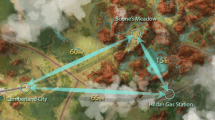Abstract
Serious video games have been proposed as a means to engage students with the Science, Technology, Engineering, Mathematics (STEM) curriculum, but there is limited research on the required game elements and teaching practices. In particular, there is limited evidence on the effects of the storytelling element and of student involvement in making games on the learning performance and on the attitudes of the students. For this purpose, we designed a between groups experiment with eighty students (12 to 13 years old). They formed three equivalent groups of twenty students each who practiced with a serious game in three different ways. The first group played the storytelling game, the second played the same game but with no story, and the third was engaged with modifying the game code. Finally, the last (control) group practiced traditionally by solving exercises on paper. We found that girls with low grades benefited the most by playing the game and by engaging with the code and that the game making group wishes to repeat the exercise. Further research should perform similar studies with a focus on involving students in serious game modification, over longer periods of time and for additional curriculum topics.
Access this chapter
Tax calculation will be finalised at checkout
Purchases are for personal use only
Preview
Unable to display preview. Download preview PDF.
Similar content being viewed by others
References
Becker, K.: Teaching with games: the Minesweeper and Asteroids experience. Journal of Computing Sciences in Colleges 17(2), 23–33 (2001)
Buechley, L., Eisenberg, M., Catchen, J., Crockett, A.: The LilyPadrduino: Using Computational Textiles to Investigate Engagement, Aesthetics, and Diversity in Computer Science Education. In: Proc. of CHI 2008. ACM Press (2008)
Bopp, M.: Storytelling as a motivational tool in digital learning games. Didactics of Microlearning. Concepts, Discourses and Examples, 250–266 (2007)
Charsky, D.: From edutainment to serious games: A change in the use of game characteristics. Games and Culture 5(2), 177–198 (2010)
Egenfeldt-Nielsen, S.: Overview of research on the educational use of video games. Digital Kompetanse 1(3), 184–213 (2006)
Fu, F.L., Su, R.C., Yu, S.C.: EGameFlow: A scale to measure learners’ enjoyment of e-learning games. Computers & Education 52(1), 101–112 (2009)
Giannakos, M., Hubwieser, P., Chrisochoides, N.: How students estimate the effects of ICT and programming courses. In: Proceeding of the 44th ACM Technical Symposium on Computer Science Education, pp. 717–722 (2013)
Giannakos, M.N., Vlamos, P.: Educational webcasts’ acceptance: Empirical examination and the role of experience. British Journal of Educational Technology 44(1), 125–143 (2013)
Hartmann, T., Klimmt, C.: Gender and computer games: Exploring females’ dislikes. Journal of Computer! Mediated Communication 11(4), 910–931 (2006)
Lewis, C.M.: How programming environment shapes perception, learning and goals: Logo vs. Scratch. In: Proceedings of the 41st ACM Technical Symposium on Computer Science Education, pp. 346–350 (2010)
Murphy, J.: Effective schools: Legacy and future directions. In: Reynolds, D., Cuttance, P. (eds.) School Effectiveness, Research, policy and practice. Cassel, London (1992)
Papert, S., Harel, I.: Situating constructionism. Constructionism, 1–11 (1991)
Parsons, D., Haden, P.: Programming osmosis: Knowledge transfer from imperative to visual programming environments. In: Conference of the National Advisory Committee on Computing Qualifications (2007)
Robinson, K.: Out of our minds: Learning to be creative. Capstone (2011)
Skinner, B.F.: The science of learning and the art of teaching, Cambridge, Mass, USA, pp. 99–113 (1954)
Spalter, A.M., Simpson, R.M., Legrand, M., Taichi, S.: Considering a full range of teaching techniques for use in interactive educational software: a practical guide and brainstorming session. In: 30th Annual Frontiers in Education Conference, FIE 2000, pp. S1D–19. IEEE Press (2000)
Thorndike, R.L., Hagen, E.P.: Measurement and evaluation in psychology and education (1977)
Walberg, H.J., Paik, S.J.: Effective Educational Practices. Educational Practices Series– 3 (2000)
Author information
Authors and Affiliations
Editor information
Editors and Affiliations
Rights and permissions
Copyright information
© 2013 Springer-Verlag Berlin Heidelberg
About this paper
Cite this paper
Garneli, B., Giannakos, M.N., Chorianopoulos, K., Jaccheri, L. (2013). Learning by Playing and Learning by Making. In: Ma, M., Oliveira, M.F., Petersen, S., Hauge, J.B. (eds) Serious Games Development and Applications. SGDA 2013. Lecture Notes in Computer Science, vol 8101. Springer, Berlin, Heidelberg. https://doi.org/10.1007/978-3-642-40790-1_8
Download citation
DOI: https://doi.org/10.1007/978-3-642-40790-1_8
Publisher Name: Springer, Berlin, Heidelberg
Print ISBN: 978-3-642-40789-5
Online ISBN: 978-3-642-40790-1
eBook Packages: Computer ScienceComputer Science (R0)




